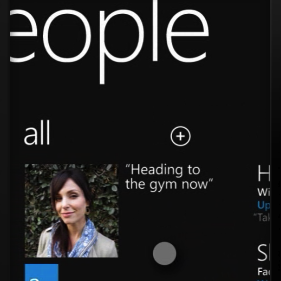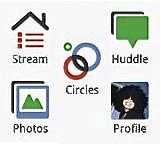
Use your Android phone to control PC overclocking
Taiwanese motherboard and video card maker MSI will soon release a free Android app that lets users wirelessly control their Afterburner GPU overclocking utility from their smartphone.
"This is not meant to replace your overclocking software (Afterburner); it's meant to complement it," MSI's Facebook page said. "Think of running a game, and you are just curious as to what the temp readings are without having to Alt+Tab out of the game, or even running it in a window. You can even force fan speed changes on the fly if you see your GPU overheating in-game, without having to exit the program. Who wants to leave in the middle of a firefight?"

Yahoo Messenger 11 smiley friends Facebook
Yahoo Messenger 11 has finally left beta after seven months and been given a final release by Yahoo. Version 11 sees a number of new features, including support for Facebook, Twitter and other social media networks.
The use of instant messaging programs has declined somewhat due to the growth of social media platforms with larger networks. Yahoo has chosen to embrace this trend by placing social media at the heart of Yahoo Messenger 11. Not only is it designed to strike up conversations via text or audio/video, but now you can also play collaborative games and interact across your Facebook network too.

Windows Phone devs get access to 'Mango' today, beta 2 of SDK
Windows Phone 7 is just about one year old, and is about to receive its first major update with "Mango," also known as Windows Phone OS 7.1. In anticipation of the release of Mango, Microsoft has rolled out Beta 2 of the Windows Phone developer toolkit which takes advantage of the new features included in the soon-to-be-released Windows Phone 7.1.
Since there are purportedly more than 500 feature updates in Windows Phone Mango, there are naturally a huge number of new tools in the SDK that open up new capabilities in apps.

TRIM Support Enabler 1.2 bulks up for Mac OS X 10.6.8, supports non-Apple SSDs
TRIM Support Enabler, a tool for enabling TRIM support on non-Apple manufactured Solid State Drives, has been updated to version 1.2. The change is a minor one, designed to make the tool more compatible with OS X 10.6.8, which was released last week.
TRIM support is a technology designed to optimise SSD performance, which is affected over time as data is written to and deleted from the drive. TRIM Support Enabler successfully allows OS X Snow Leopard to recognize, and utilize, TRIM support on SSD drives that aren't manufactured by Apple.

IT demand for cloud services will generate $9.4B in new server sales
Spending on public and private clouds will generate $3.6 billion and $5.8 billion, respectively, in server spending by 2015, IDC forecasts. While there has been much written about public clouds, many IT organizations are setting up their own infrastructure to provide employees with access to their data anytime, anywhere and on anything.
No matter which cloud, many businesses today face huge security and privacy risks because of the volume of data taken outside on laptops, smartphones and other mobile devices. What's the point spending thousands, even millions of dollars, on network security, only to let crown jewels of information roam freely on mobile devices?

Is Google+ social done right?
It's the question I'm asking after watching the six videos embedded in this analysis and reading the blog post by Vic Gundotra, Google senior vice president of Engineering.
To be clear, I've read no other posts about Google+, not even the news story by colleague Tim Conneally (well, I did write the headline -- but that was all). That's typical of my writing. I prefer to have a fresh perspective, uninfluenced by others' opinions as much as possible. All observations I make here are solely my own.

Get Microsoft Office 2010 Service Pack 1 right here!
Coinciding with the launch of Office 365 on Tuesday, Microsoft rolled out the final stable version of Office 2010 Service Pack 1.
This is the update to the SP1 beta that was published last November, and it includes security, performance, and stability upgrages as well as a "roll up" of all the previous patches and fixes that were issued.

How do you know a platform has made it? Angry Birds
OK, exclusive Angry Birds -- and, in this case, they're good for the old platform, too.
Earlier today, Barnes & Noble announced availability of exclusive Angry Birds unlockables, including Mighty Eagle, free for Nook Color. Consumers need three things: The tablet, game app and to be physically present in a Barnes & Noble store.

MySpace set to be sold for less than $30 million?
MySpace appears set to be sold this week as News Corp aims to get rid of the unprofitable social networking site before the end of the month, which is also the end of the company's fiscal year. The desperation to sell in such short order has also resulted in the site being offered at a rock bottom price: likely somewhere between $20 and $30 million.
That valuation is far from what the company had hoped to get -- about $100 million -- and pocket change compared to the $500 million News Corp dished out for the site when it purchased MySpace in 2006.

MAGIX Music Maker 17 -- Silver edition is free
When it comes to creating music with your computer, it can be difficult to know where to start. There is certainly no shortage of titles to choose from, but for anyone that isn't already an accomplished musician, the complexity of much of the music creation software that is available can be off-putting -- hefty price tags can often be an issue as well. MAGIX Music Maker Silver 17 is a little different, in as much as it is not only incredibly easy to use, it is available completely free of charge.
The Silver release of MAGIX music creation software is a somewhat cutdown version of the title's big brother. The number of audio channels you have available to work with has been reduced to four, and the number of samples included has also shrunk somewhat. In the free version of the program, there are only three musical styles to choose from when it comes to samples, and the range of instruments is far more restricted.

Thunderbird 5 is live -- grab it now!
Mozilla has placed the final code for Thunderbird 5.0 on its download servers. Version 5.0 represents the first major upgrade of Thunderbird for 18 months, although the number of headline features is relatively small: an improved email account wizard, better and more versatile tab handling, and a brand new Add-ons Manager and extensions management API.
There's also a new troubleshooting information page (accessible from the Help menu) that contains key information about your individual Thunderbird setup to aid fixing problems that may occur, as well as the fact attachments are now displayed with the file size next to them.

Google responds to Office 365: Help us compile 365 reasons Apps is better
Yesterday in the cleverly titled "365 reasons to consider Google Apps" blog post, Shan Sinha, Google Apps product manager, gave just four why his company's cloud suite is better than Microsoft. Motivation: Today's global launch of Office 365.
I observed that four is a long way from 365. Apparently someone at Google was listening. Last night the GoogleAtWork Twitter account tweeted: "Help us to 365! Many asked for all 365 reasons to consider GoogleApps. Add yours here http://t.co/DTjLZZu or tweet #apps365". About three hours ago, Google issued the "Final call! Many asked for 365 reasons to consider GoogleApps".

Google activates 500,000 Android devices daily
Android's march towards smartphone market dominance continued on Tuesday, as Google's Android chief Andy Rubin disclosed that activations continued to grow at a torrid pace. "There are now over 500,000 Android devices activated every day, and it's growing at 4.4% [week over week]," he tweeted early Tuesday morning.
Putting that in perspective, it was only at the Google I/O conference in May that Google reported surpassing 400,000 daily activations. Before that, in December Android surpassed 300,000 activations per day, and at that point was the first time it was surpassing total iOS daily activations on a regular basis.

Google+ is much more than a Facebook killer
Google on Tuesday unveiled a large-scale social sharing project it's calling Google+. Not to be confused with the +1 button it introduced in March, Google+ is a five-pronged, post-Facebook approach to social networking and collaboration.
The Five Prongs of Google+

Mozilla to start thinking about enterprise needs
Firefox is an [in]famously difficult product for IT to deploy and manage in large organizations. They may be dragged kicking and screaming into it, but Mozilla will now begin to at least consider the needs of enterprises.
The first version of Firefox was released on Nov. 9, 2004. Its usage share worldwide seems to be in the neighborhood of 27 percent, but in some countries, like Germany, it's much higher, even a majority of all users. That's actually quite an accomplishment for a product which pointedly ignores the needs of enterprises.



